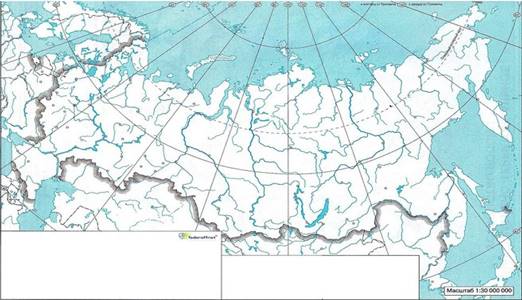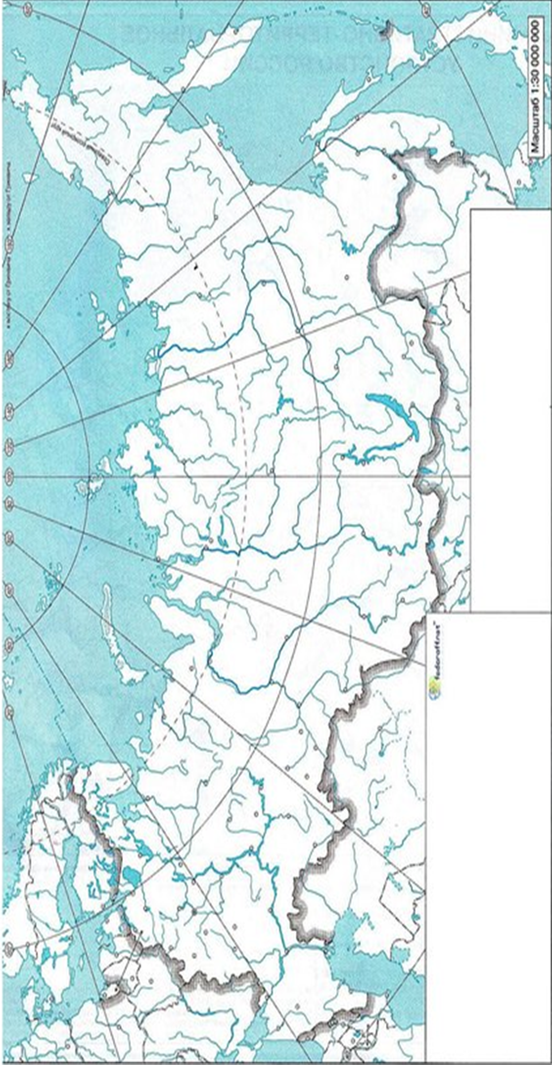
Урок-викторина “How well do you know Russia?”
Тип урока: повторение
Вид урока: урок-викторина
Цель: повторить, систематизировать и закрепить ЗУН по теме «The Russian Federation»
Задачи: 1)повторить лексический материал по теме; 2) повторить грамматический материал; 3) тренировать навыки монологической речи по теме; 4) закрепить правила построения вопросительных предложений.
Task 1. “Geographical position”
Mark the following geographical names on the map and make up sentences with them
(1st group- the Volga, the Caucasus, the Baikal, China, Moscow, The Murmansk region, The Caspian Sea
2d group – the Yenisei, the Altai, the Urals, Finland, Siberia, Murmansk, the Black Sea)

Task 2. “The political system”
Make the chart of the political system of Russia using the given words and make a report but don’t forget to use the PASSIVE VOICE
(the president, the Prime Minister, the cabinet of ministers, the Supreme court, legislative power, the state Duma, judicial power, the Federal Assembly, regional courts, executive power, the Federation Council, government, the Constitutional court)
Task 3. “Our city”
You are the guide, make an excursion around our city speaking about:
1st group –the monument to Cyril and Mephody (the Regional Scientific Library, 1970, the Fathers of the Slavic alphabet), the Northern Sport festival (Dolina Uyuta, tourists, the most famous winter sports, the icebreaker “Lenin” (museum, the sea port, unforgettable), the Arctic lights (phenomena, spectacular, autumn and winter)
2d group –the Regional museum of local lore (nature, history, animals), the monument to “Alyosha” (defenders, fireworks, flowers), the Sea port (the Fishing port, the Merchant port, various ships), Five Corners Square (center of the city, main fur- tree, city events)
!!!!!Start your sentences with:
If I were you…., / I would…. / If I had a chance to…,
While one group is speaking the second one is drawing all the mentioned sights and events
Task 4. “Famous people”
Read the text and retell it in the following way – the first group makes the 1st sentence, the second group repeats the 1st sentence and makes the 2d and so on.
The Russian scientist Mikhail Vasilievich Lomonosov was born in 1711, in the village of Denisovka near the town of Kholmogory, Arkhangelsk Gubernia, in the family of fisherman. As soon as he learned to read, little Mikhail read all the books he could get in his village. At the age of 17 he left his native place, and made his way to Moscow. In Moscow he successfully entered the Slav-Greek-Latin Academy, the only higher educational institution in Moscow at that time. Neither conditions of work nor material difficulties discouraged young Lomonosov. His brilliant capabilities and hard work enabled him to complete the seven-grade curriculum of the Academy in four years. A year later he came to Petersburg, and then was sent abroad to study metallurgy and mining. In 1741, after his return to Russia, Lomonosov became a Professor of Chemistry and a full member of the Russian Academy of Sciences. Lomonosov was a man of unusual abilities. He made great achievements in the spheres of physics, chemistry, astronomy, geology, geography, linguistics and history. Among the numerous discoveries of Lomonosov was the Law of the Conservation of Mass (закон сохранения энергии). Lomonosov himself considered chemistry his “main profession”, but he was at the same time the first Russian physicist. He gave all his energy to the promotion of Russian science. In 1755 thanks to his efforts the Moscow University was founded. The university became a major center of Russian enlightenment and science. Mikhail Lomonosov was the most famous person in the 18th century. He died in 1765 at the age of 54.
Task 5. “Holidays and traditions”
Ask questions to the underlined words:
New Year's Day is the major family holiday for many Russians. It is a national holiday in Russia, on which most businesses and public offices are closed. Schools and universities are closed as part of their winter holidays at this time of the year. New Year's dinner usually starts late on December 31st and includes Russian salad, dressed herring, sparkling wine and other national food. Five minutes before the clock strikes midnight people watch the president's speech on TV and raise a toast to the chiming of the Kremlin clock. After that the Russians congratulate each other and exchange presents. Some people go outside to play snowballs, make a snowman or set off fireworks. Some Russians celebrate this day at their friends' houses or attend the fireworks displays in their city. Celebrations for children include a decorated fir tree and Grandfather Frost, the Russian equivalent of Santa Claus who is believed to bring presents. Grandfather 'Frost often comes with his granddaughter, Snegurochka (Snow Girl).

Task 1. “Geographical position”
Mark the following geographical names on the map and make up sentences with them
the Volga, the Caucasus, the Baikal, China, Moscow, The Murmansk region, The Caspian Sea
Task 1. “Geographical position”
Mark the following geographical names on the map and make up sentences with them
the Yenisei, the Altai, the Urals, Finland, Siberia, Murmansk, the Black Sea
Task 2. “The political system”
Make the chart of the political system of Russia using the given words and make a report but don’t forget to use the PASSIVE VOICE
(the president, the Prime Minister, the cabinet of ministers, the Supreme court, legislative power, the state Duma, judicial power, the Federal Assembly, regional courts, executive power, the Federation Council, government, the Constitutional court)
Task 3. “Our city”
You are the guide, make an excursion around our city speaking about:
the monument to Cyril and Mephody (the Regional Scientific Library, 1970, the Fathers of the Slavic alphabet), the Northern Sport festival (Dolina Uyuta, tourists, the most famous winter sports, the icebreaker “Lenin” (museum, the sea port, unforgettable), the Arctic lights (phenomena, spectacular, autumn and winter)
!!!!!Start your sentences with:
If I were you….
I would….
If I had a chance…
Task 3. “Our city”
You are the guide, make an excursion around our city speaking about:
the Regional museum of local lore (nature, history, animals), the monument to “Alyosha” (defenders, fireworks, flowers), the Sea port (the Fishing port, the Merchant port, various ships), Five Corners Square (center of the city, main fur- tree, city events)
!!!!!Start your sentences with:
If I were you….
I would….
If I had a chance…
Task 4. “Famous people”
Read the text and retell it in the following way – the first group makes the 1st sentence, the second group repeats the 1st sentence and makes the 2d and so on.
The Russian scientist Mikhail Vasilievich Lomonosov was born in 1711, in the village of Denisovka near the town of Kholmogory, Arkhangelsk Gubernia, in the family of fisherman. As soon as he learned to read, little Mikhail read all the books he could get in his village. At the age of 17 he left his native place, and made his way to Moscow. In Moscow he successfully entered the Slav-Greek-Latin Academy, the only higher educational institution in Moscow at that time. Neither conditions of work nor material difficulties discouraged young Lomonosov. His brilliant capabilities and hard work enabled him to complete the seven-grade curriculum of the Academy in four years. A year later he came to Petersburg, and then was sent abroad to study metallurgy and mining. In 1741, after his return to Russia, Lomonosov became a Professor of Chemistry and a full member of the Russian Academy of Sciences. Lomonosov was a man of unusual abilities. He made great achievements in the spheres of physics, chemistry, astronomy, geology, geography, linguistics and history. Among the numerous discoveries of Lomonosov was the Law of the Conservation of Mass (закон сохранения энергии). Lomonosov himself considered chemistry his “main profession”, but he was at the same time the first Russian physicist. He gave all his energy to the promotion of Russian science. In 1755 thanks to his efforts the Moscow University was founded. The university became a major center of Russian enlightenment and science. Mikhail Lomonosov was the most famous person in the 18th century. He died in 1765 at the age of 54.
Task 5. “Holidays and traditions”
Ask questions to the underlined words:
New Year's Day is the major family holiday for many Russians. It is a national holiday in Russia, on which most businesses and public offices are closed. Schools and universities are closed as part of their winter holidays at this time of the year. New Year's dinner usually starts late on December 31st and includes Russian salad, dressed herring, sparkling wine and other national food. Five minutes before the clock strikes midnight people watch the president's speech on TV and raise a toast to the chiming of the Kremlin clock. After that the Russians congratulate each other and exchange presents. Some people go outside to play snowballs, make a snowman or set off fireworks. Some Russians celebrate this day at their friends' houses or attend the fireworks displays in their city. Celebrations for children include a decorated fir tree and Grandfather Frost, the Russian equivalent of Santa Claus, who is believed to bring presents. Grandfather Frost often comes with his granddaughter, Snegurochka (Snow Girl).
|
|
GROUP №1 |
GROUP №2 |
|
Task 1 |
|
|
|
Task 2 |
|
|
|
Task 3 |
|
|
|
Task 4 |
|
|
|
Task 5 |
|
|
|
|
GROUP №1 |
GROUP №2 |
|
Task 1 |
|
|
|
Task 2 |
|
|
|
Task 3 |
|
|
|
Task 4 |
|
|
|
Task 5 |
|
|
|
|
GROUP №1 |
GROUP №2 |
|
Task 1 |
|
|
|
Task 2 |
|
|
|
Task 3 |
|
|
|
Task 4 |
|
|
|
Task 5 |
|
|
Материалы на данной страницы взяты из открытых источников либо размещены пользователем в соответствии с договором-офертой сайта. Вы можете сообщить о нарушении.